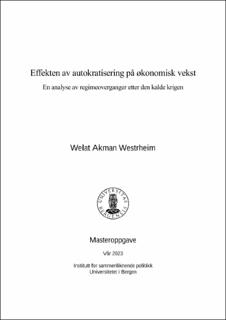| dc.description.abstract | What impact does autocratization have on economic growth? This thesis examines this question by considering that autocratization has taken various forms since the Cold War, and resulted in different types of regime transitions towards autocracy. As autocratization is on the rise globally, it becomes crucial to understand the potential consequences of authoritarian regime changes on a fundamental political objective in most countries: economic growth. Based on these assumptions, the thesis aims to investigate the effects of regime transitions from (1) democracy to autocracy, and (2) electoral autocracy to closed autocracy on economic growth between 1992 and 2019. To measure regime transitions, the thesis utilizes the newly developed dataset: Episodes of Regime Transformation (ERT) (Edgell, Maerz, et al. 2020). From the data obtained from ERT, the thesis identifies 22 regime transitions from democracy to autocracy and 15 transitions from electoral autocracy to closed autocracy. Economic growth is measured using data from the Penn World Table (Feenstra, Inklaar, og Timmer 2015). Methodologically, the thesis situates itself within the counterfactual tradition of causality. This means that the potential values for economic growth are assumed to be generated either by the presence or absence of an autocratic regime transition. Thus, regime transition is considered a treatment that could potentially affect economic growth. To estimate the average treatment effect on the treated (ATT) of autocratic regime transitions on GDP per capita growth, two econometric methods are employed: interactive fixed effects counterfactual estimator (Liu, Wang, og Xu 2022) and panelmatching (Imai, Kim, og Wang 2021). These methods are chosen for their ability to accommodate dichotomous treatments and account for units receiving multiple treatments over time. This is important, as some regimes have undergone multiple cycles of autocratization and democratization between 1992 and 2019. The thesis does not provide significant evidence to support the claim that transitions from democracy to autocracy lead to a decrease in economic growth. However, the study reveal a notable impact when transitions occur from electoral autocracy to closed autocracy. More specifically, the thesis find an average negative effect on growth of leaving electoral autocracy on the order of -3 percent over the 1992-2019 panel. This finding might underscore the role of democratic institutions within electoral autocracies in fostering economic growth. However, it is important to interpret these results with caution, considering the choices made in regard to conceptualization, measurement strategy, and the inherent limitations associated with an econometric approach. | |
